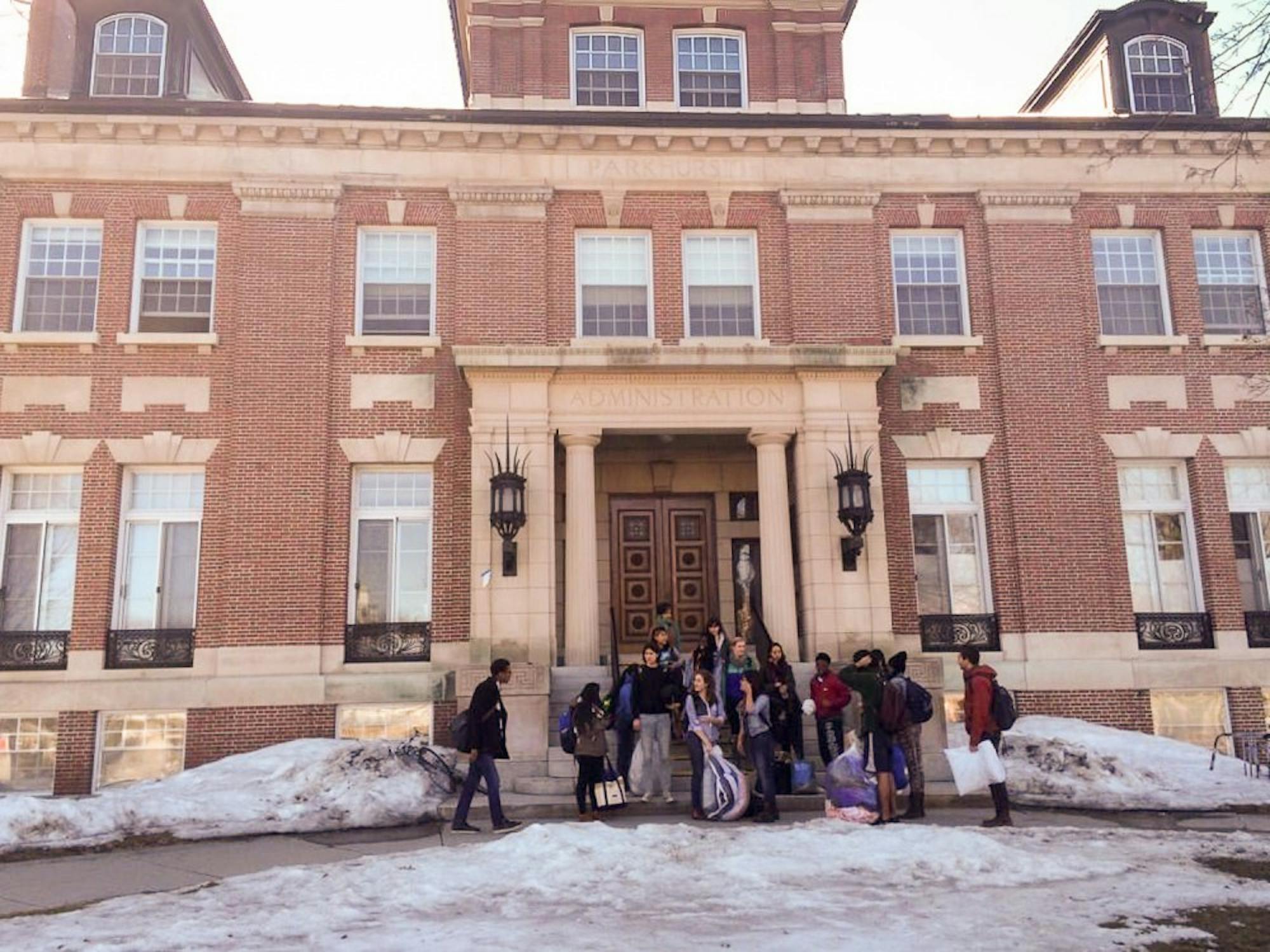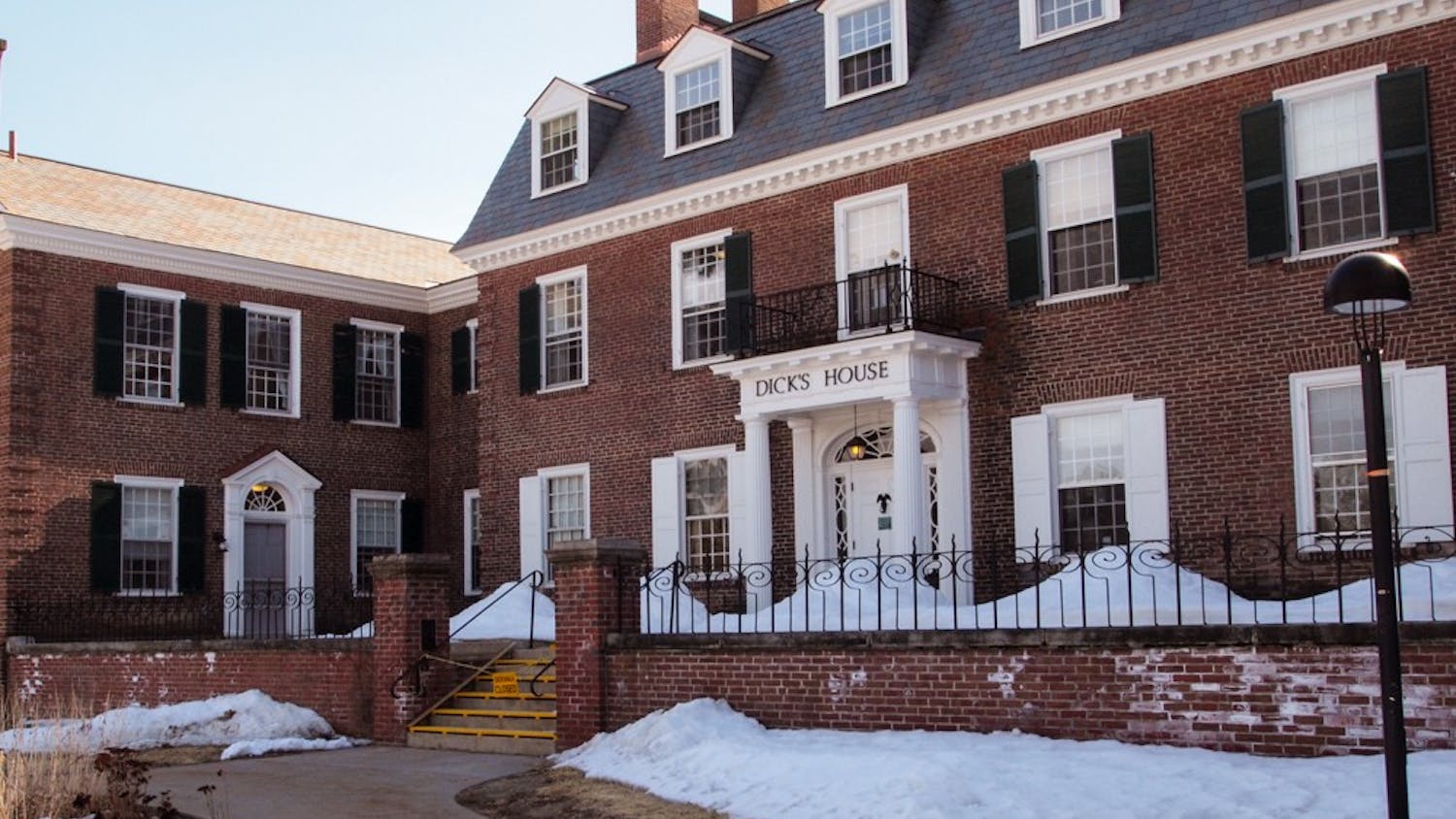Updated on April 5, 2014
Just after 4 p.m. on Thursday, the 16 students who remained in College President Phil Hanlon’s office after a two-day sit-in left Parkhurst Hall, following a meeting with Dean of the College Charlotte Johnson. At the meeting, students presented Johnson with their terms of departure, stipulating that they would not face disciplinary action beyond “low-level judicial review,” would have access to protection around campus and asking for College representatives to stop referring to them as “threatening.”
“We are not a threat, though we may have been an inconvenience,” the document read. “It is our safety and wellbeing that are daily threatened on this campus.”
College spokesperson Justin Anderson confirmed that Johnson signed an agreement with the students. The College remains committed to conducting a campus climate survey, he said, and there are plans for the students to discuss “Freedom Budget” items with the appropriate administrators.
“We’re pleased that the students decided to leave, and we look forward to working constructively with them in the future,” Anderson said.
The sit-in, which began Tuesday afternoon, was held to protest Hanlon’s response to the “Freedom Budget,” a student-authored document that proposed over 70 ways for the College to “eradicate systems of oppression.”
Thursday evening, a copy of the agreement presented to Johnson was posted on the student group’s public Facebook page. A caption said the post was a copy of the agreement that Johnson had signed, though her signature was not included in the image.
The agreement resulted from a 3 p.m. meeting between Johnson and the remaining protestors, said Jillian Mayer ’14, who participated in the sit-in.
In addition to asking for assurance that any disciplinary action taken would not be noted on their records and for protection, they asked that the campus climate survey be released by the end of 2016.
By April 7, the document read, students expect to receive a list indicating the point-person for each demand. Meetings with these administrators will be conducted by May 20, it said.
Mayer said that although the students are glad that Johnson signed the agreement, the debate is not over.
“I won’t be satisfied until the resources and power are redistributed in a radically equitable way,” she said. “There is still work for all of us to do.”
On Wednesday, Mayer said, Safety and Security officers stationed in Parkhurst told students that they would limit food deliveries on Thursday to two shifts: 11:30 a.m. and 5:30 p.m.
Anderson said that the decision was made in part to minimize distractions to those working in Parkhurst. Though Hanlon worked “off-site” yesterday, other employees remained in Parkhurst.
“It is, in fact, an office,” Anderson said.
Students were told each day they remained in the office that they were trespassing and violating College policy.
The sit-in felt “a little like a hostage situation,” Mayer said, noting that students could only use one bathroom and were not supposed to leave the office.
Anderson called the interactions between the students and the administration “civil and largely respectful,” noting that threats are “not what we condone, not what we endorse, not what we support.”
While the students who stayed overnight in Parkhurst missed two days of class, Mayer said that most professors were understanding.
“They know that education doesn’t just happen in the classroom,” she said.
Mayer said that the students decided to hold the sit-in because they felt that the administration was not giving enough attention to issues raised in the “Freedom Budget.”
“This is urgent for many, many students on campus --— students of color, queer students, other people who are marginalized,” she said.
The protest began Tuesday when a group of around 35 entered Hanlon’s office during his open office hours. Students asked Hanlon to indicate his stance on each “Freedom Budget” demand with a check mark on a copy of the document. Hanlon left his office around 5:15 p.m. Tuesday.
Eight students slept in Hanlon’s office Tuesday night, while 19 did so the following night.
On Wednesday, around 75 people demonstrated in front of Parkhurst, then marched around campus..
During a Wednesday afternoon meeting, Mayer said, Hanlon refused to address the “Freedom Budget.”
“As the symbolic figurehead of the institution,” Mayer said, “it would send a huge signal to students, parents, alumni and board members to know that the president is explicitly anti-racist, anti-sexist anti-homophobic, anti-transphobic and anti-ableist.”
Other sit-in participants did not respond to multiple requests for comment on Thursday afternoon and evening.
This article has been revised to reflect the following correction.
Correction appended: April 5, 2014
Due to an editing error, the initial version of the article incorrectly stated that students who participated in the April 1-3 sit-in of College President Phil Hanlon's office would not face disciplinary action.
The initial version of a document listing the sit-in participants' terms of departure stated that there would be "no punishment of any sort" for sit-in participants. A handwritten amendment revised the document to delete that phrase, instead indicating "that there will be no punishment for anyone who participated in this sit-in at any point beyond low-level judicial review not noted on any student’s record."
This aligns with College policy, College spokesperson Justin Anderson said in an email.
The initial version of the article failed to reflect the amendment regarding potential disciplinary action, misrepresenting the agreement signed by Dean of the College Charlotte Johnson. The document was public information by press time, and we regret the error.
The sit-in participants violated Standard VIII of the College's Standards of Conduct, Anderson said in an email. The policy states that "students and student organizations must not intentionally disrupt, interfere with or obstruct teaching, research or College administration." The policy prohibits disruptive activity, including occupation of a private office, blocking entry into a College building, preventing College employees from working and remaining in a building after it closes.
According to the agreement, the students will not face a Committee on Standards hearing, financial aid or scholarship revocation, "impact on" a fifth or sixth year of study, impediments to graduation, foreign study program or language study abroad revocation or "any other impediments" to their "educational or social experiences." If a student is brought up on judicial charges again, an additional handwritten amendment read, the violation can be considered when determining sanctions.
"The agreement reflects what would happen to any student who violated Standard VIII," Anderson said in an email.



